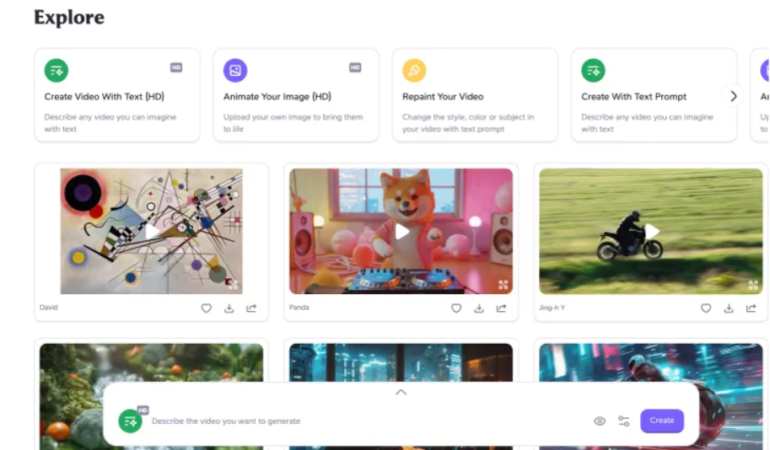- Yishu Miao and Ziyu Wang, former Deepmind members, introduce Haiper, their AI-powered video generation tool.
- Haiper focuses on video generation after transitioning from 3D reconstruction, raising $13.8 million in seed funding.
- Users can create HD videos using text prompts on Haiper’s platform, with plans for additional features like video extension.
- The company aims to maintain free features while exploring potential commercial collaborations.
- Haiper seeks to develop a core video generation model for wider adoption, considering open-sourcing its models.
- The competition includes OpenAI’s Sora, Google, and Nvidia-backed Runway, and Stability AI’s Stable Diffusion Video model.
Main AI News:
AI-driven video production has emerged as a thriving sector following the recent debut of OpenAI’s Sora model. Yishu Miao and Ziyu Wang, both alums of Deepmind, have unveiled Haiper, their own video generation tool, powered by a proprietary AI model.
Miao, who previously served at TikTok in the Global Trust & Safety team, and Wang, a former research scientist at Deepmind and Google, initiated work on Haiper in 2021, formalizing its incorporation in 2022. The duo, proficient in machine learning, initially delved into 3D reconstruction using neural networks. However, after immersing themselves in video data training, Miao revealed to TechCrunch that they found video generation to be a more compelling challenge than 3D reconstruction. Consequently, Haiper shifted its focus toward video generation approximately six months ago.
Haiper secured $13.8 million in seed funding led by Octopus Ventures, with participation from 5Y Capital. Prior to this, angel investors such as Geoffrey Hinton and Nando de Freitas facilitated a $5.4 million pre-seed round in April 2022.
Haiper’s video generation platform enables users to create videos by inputting text prompts on the company’s website. However, certain limitations apply: users can generate only a two-second HD video or a slightly lower-quality four-second video. The platform offers additional features, such as image animation and video restyling, with plans to introduce capabilities for video extension.
Miao emphasized the company’s commitment to keeping these features free to foster a thriving community. While contemplating potential subscription models for video generation, Haiper has engaged in collaborations with companies like JD.com to explore commercial applications.
Despite its current focus on consumer-facing initiatives, Haiper aspires to develop a core video generation model for wider adoption. Although details about the model remain undisclosed, the company has initiated private outreach to developers for feedback and is considering open-sourcing its models in the future.
Addressing the uncanny valley phenomenon in video generation, Miao highlights the importance of refining AI-generated human figures to appear more natural in movement and appearance. With approximately 20 employees, Haiper actively recruits talent across engineering and marketing disciplines.
In the competitive landscape, Haiper faces formidable rivals such as OpenAI’s Sora and Google and Nvidia-backed Runway. Notably, Stability AI introduced the Stable Diffusion Video model in a research preview last year. Rebecca Hunt of Octopus Venture anticipates that Haiper must develop a robust video generation model to differentiate itself in the market within the next three years.
Investors remain optimistic about the potential of AI-powered video generation startups while acknowledging the technology’s ongoing evolution. Justine Moore of a16z compares the current state of AI video technology to GPT-2, highlighting the need for further advancements before widespread consumer adoption akin to the ‘ChatGPT moment’ in text-based AI applications.
Conclusion:
The emergence of Haiper in the AI video generation market signifies intensified competition among players like OpenAI, Google, Nvidia, and Stability AI. With Haiper’s focus on user-friendly features, potential commercial partnerships, and future model development, the market is poised for innovation and differentiation. Investors and industry observers anticipate significant advancements in AI-powered video generation technologies in the coming years, potentially revolutionizing content creation and consumption across various sectors.

